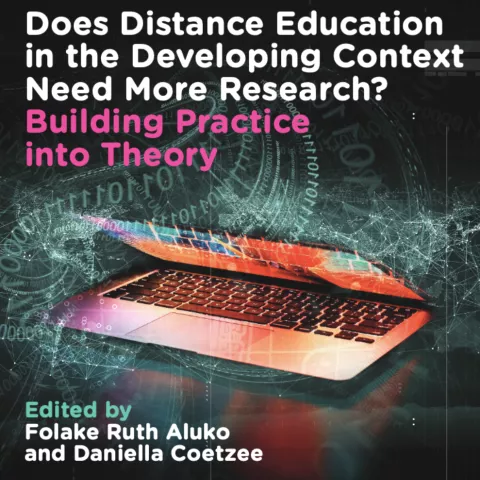Research can have a transformative impact on any field, and distance education is no exception. It can, for example, contribute to more effective use of new educational strategies, provide insights into technological advancements, and contribute to our understanding of the key successes and challenges in distance education delivery.
While the concept of distance education dates back more than a century, research in this area is relatively nascent when compared to the development of educational research in general. The body of literature on the practice, influence, and impact of distance education is therefore limited, and even more so when considering developing world contexts. This, combined with the fact that distance education is experiencing significant shifts in terms of new demands and evolving technologies that provide new potential and pitfalls alike, mean that the recently published book Does Distance Education in the Developing Context Need More Research? Building Practice into Theory is a critical addition to the distance education research literature.
The book explores the reciprocal relationship between theory and practice in distance education, and we are honoured to have contributed two chapters to it. Edited by Dr Folake Ruth Aluko and Prof. Daniella Coetzee, the book is divided into two volumes which explore various themes:
Volume 1 focusses on the history, approaches and paradigms in distance education; building frameworks in distance education research; and praxis in this area.
Volume 2 moves on to address regional trends and gaps in distance education research; scholarship in this area; and quality assurance.
The two chapters that we contributed focus on the intersection of distance education and catalysing open education praxis, with each chapter approaching this intersection from a different angle. Each is outlined below.
Chapter 12 - Approaches To Continuing Professional Development For Open Education Practices In Africa
The COVID-19 pandemic brought the importance of professional development on effective teaching and learning for university academics into sharp relief. Universities found themselves having to close their campuses and were unable to teach their students face-to-face. Universities in Africa resorted to various strategies to reach students, ranging from no teaching taking place, through emergency remote teaching (ERT) with some form of online teaching, to fully implemented e-learning. Whatever form the teaching has taken, academics have found that traditional lecturing has not been effective when implementing ERT or online teaching. Those who are experienced in adult pedagogies have been expressing the inadequacies of the lecture mode for many years, and the realities of the new forms of teaching required have brought such shortcomings to the fore. Several recent opinion pieces have expressed the need for continuing professional development (CPD) of academic staff, especially with respect to their teaching competence, arguing that it needs to be a central strategy within higher educational institutions (HEIs) around the world, supporting academics with digital teaching and communities of practice.
This chapter opens with a review of successful and innovative CPD models and approaches used in HEIs around the world. It examines recent CPD activities created by OER Africa and describes their development, piloting, and deployment, together with the implications the pilot findings have for ODL institutions and research in the field.
Chapter 13 - Measuring implementation of UNESCO’s OER Recommendation: A possible framework
Drawing on a comprehensive literature review of best practice in OER measurement, as well as experience of working with UNESCO to support implementation of the Recommendation, this chapter presents an initial framework for the measurement of the effectiveness of the OER Recommendation and proposes indicators that regions, countries, and/or institutions could adopt or adapt to rigorously measure both how OER is used and its effectiveness for improving learning. Putting in place shared understandings of what counts as effectiveness for OER is critical to inform ongoing developments and improvements in the field. Such measures can also provide an evidence base that can be used for advocacy work around the importance of OER for quality open and distance learning.

